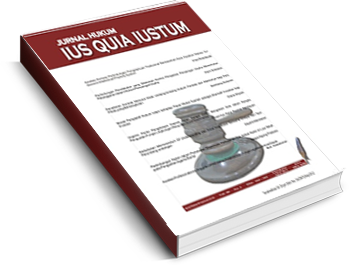Main Article Content
Abstract
This research emphasizes on the issue on the status of MoU (Master of Understanding) and SKB (Joint Decree) in the perspective of regulatory theories, binding power and implication of MoU and SKB towards the institutions and/or commission issuing it. This is a normative legal research with the secondary data in the form of primary, secondary and tertiary law materials using a regulatory approach. The results of this result then show that: first, SKB (Joint Decree) about the ethic code and Guidelines of Judge Attitude in the perspective of regulatory theory can be categorized as a policy regulation. MoU about the Optimality of Corruption Eradication in the perspective of regulatory theories is not able to be categorized as a part of regulations. Second, the SKB (Joint Decree) has a strong binding power towards MA (Supreme Court) and KY (Judicial Commission). MoU has emerged a binding power to KPK (Committee of Corruption Eradication), POLRI (Indonesian Police) and Kejari (District Attorney) since it is in Agreement is Agreement category that binds all parties. Third, SKB about Ethic Code and Judge Attitude Guidelines emerges an implication that MA and KY must obey SKB that has been made altogether. MoU about the Optimization of Corruption Eradication emerges an implication resembling to Agreement is Agreement. Hence, KPK, Polri and Kejari must obey all agreements.
Keywords
Article Details
Authors who publish with this journal agree to the following terms:
a. Authors retain copyright and grant the journal right of first publication with the work simultaneously licensed under a Creative Commons Attribution License that allows others to share the work with an acknowledgement of the work's authorship and initial publication in this journal.
b. Authors are able to enter into separate, additional contractual arrangements for the non-exclusive distribution of the journal's published version of the work (e.g., post it to an institutional repository or publish it in a book), with an acknowledgement of its initial publication in this journal.




